Zosi Automotive Research releases "2024 In-Car XR (VR/AR/MR) Industry Research Report".
In-Car XR (Extended Reality) is an innovative technology that integrates virtual reality (VR), augmented reality (AR), and mixed reality (MR) technologies into in-car systems. It provides drivers and passengers with a richer and more intuitive information interaction experience, making it an important manifestation of differentiation in future smart cabins.
XR integrates with in-car systems and smartphones to create a multi-terminal integrated experience.
In March 2023, Rokid collaborated with Ideal Auto to release the Rokid Max, which supports the L series models. The Ideal car system application allows for screen casting to VR glasses, enabling activities such as watching movies, gaming, and online office work. Additionally, it supports screen casting from handheld game consoles to the central control screen, and then further to the glasses. Through gesture interaction functionality, users can control the car system and play games.
Rokid collaborates with Ideal to launch Rokid Max+, an intelligent cabin solution.
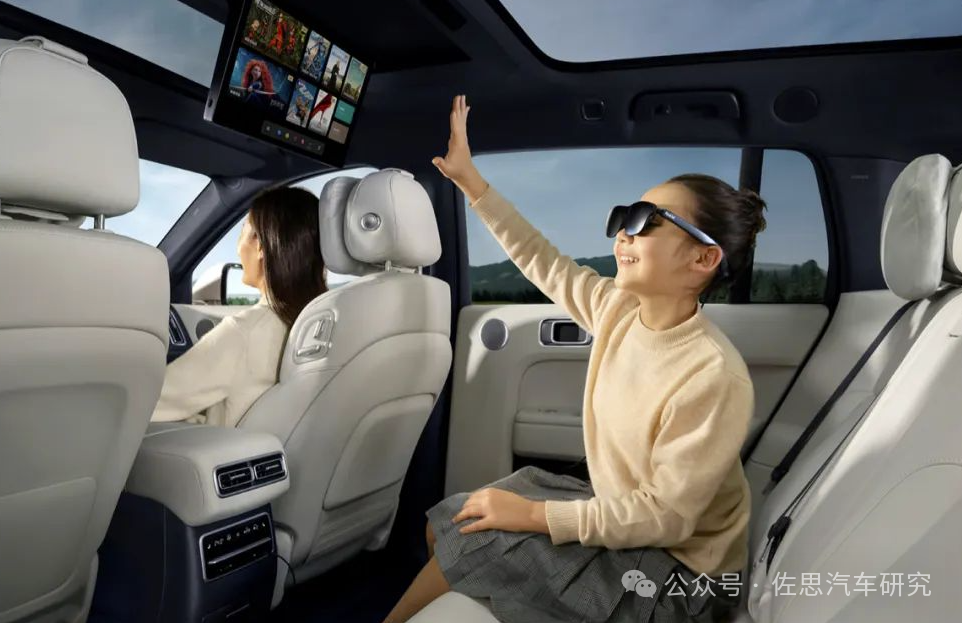
Source: Ideal Automobile
In November 2023, Starco Meizu released the MYVU smart AR glasses based on the Flyme AR operating system. Through Flyme Link (a solution for seamless integration between car and smartphone) connected to Meizu smartphones, besides being able to stream phone calls, music, videos, navigation, important app notifications, and more to the AR glasses, it also allows the AR glasses to share the phone's computing power and network, reducing the glasses' power consumption and achieving long battery life. In the future, MYVU AR glasses will be integrated with cars and smartphones to create a seamless experience through the seamless flow of applications and data across multiple terminals.
Therefore, at the press conference, Starco Meizu also announced the upgrade of the operating system Flyme to FlymeOS, known in Chinese as "无界OS" (Wujie OS). FlymeOS includes Flyme 10 (mobile phone operating system), Flyme Auto (Meizu's in-car system), and Flyme AR (AR glasses operating system), completing coverage across the three major areas of mobile phones, XR, and smart cars. "FlymeOS" will feature the characteristics of "interconnection of all things" and "unboundedness," serving as the foundation for connecting various terminals.
Starco Meizu is strategically positioning itself in the XR, mobile phone, and smart car industries, aiming for seamless integration across multiple platforms.
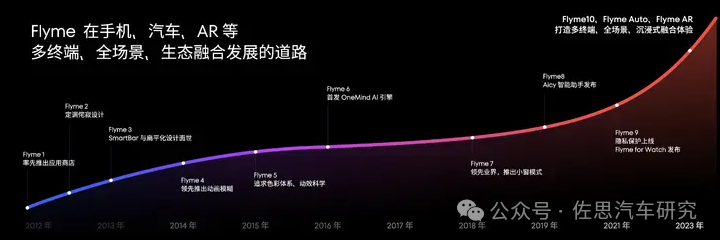
Source: Starco Meizu
AI+AR, Enhancing Voice Interaction Experience
At CES 2024, Raybird unveiled its binocular full-color MicroLED optical waveguide AR glasses, the Raybird X2 Lite, featuring the integration of the large-scale voice assistant Rayneo AI (released in December 2023). With Rayneo AI, the Raybird X2 Lite can achieve various capabilities such as multi-turn natural language dialogue, itinerary planning, convenient encyclopedia queries, brainstorming, etc. It also supports AI-assisted translation, 3D spatial navigation, first-person perspective image creation, and other functions. In March 2024, Raybird successfully completed a new round of financing worth hundreds of millions of yuan, which will be used for the research and development, mass production, and promotion of the next generation of AR glasses, as well as the advancement of AI+AR glasses ecosystem construction.
The latest AR glasses from Raybird, the X2 Lite, have introduced an AI large-scale model.
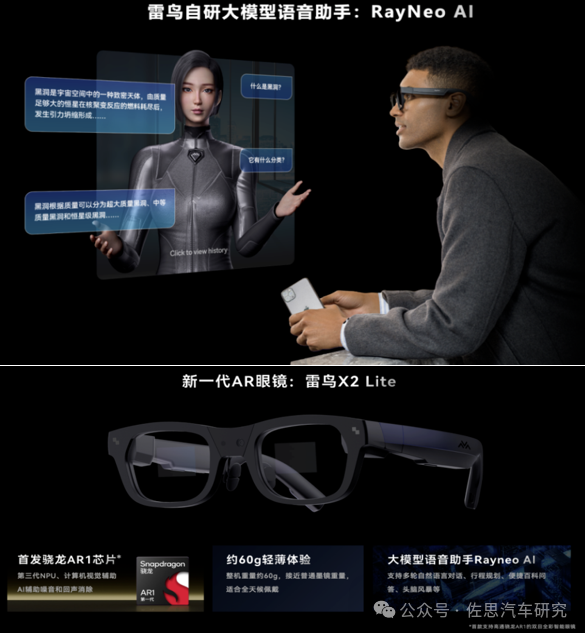
Source: Raybird Innovation
Meizu Starrybird is also venturing into AI+AR. In November 2023, Meizu Starrybird released two models of MYVU series AR glasses, integrated with FlymeAI large model. Based on AI's ability to instantly activate the AI assistant, it provides collaborative services for daily life and work such as travel guides, study plans, and business analysis. Additionally, the AR glasses feature functions such as prompter, real-time translation (Chinese-English bilingual), and cycling navigation.
Meizu's MYVU series AR glasses integrate with FlymeAI large model.
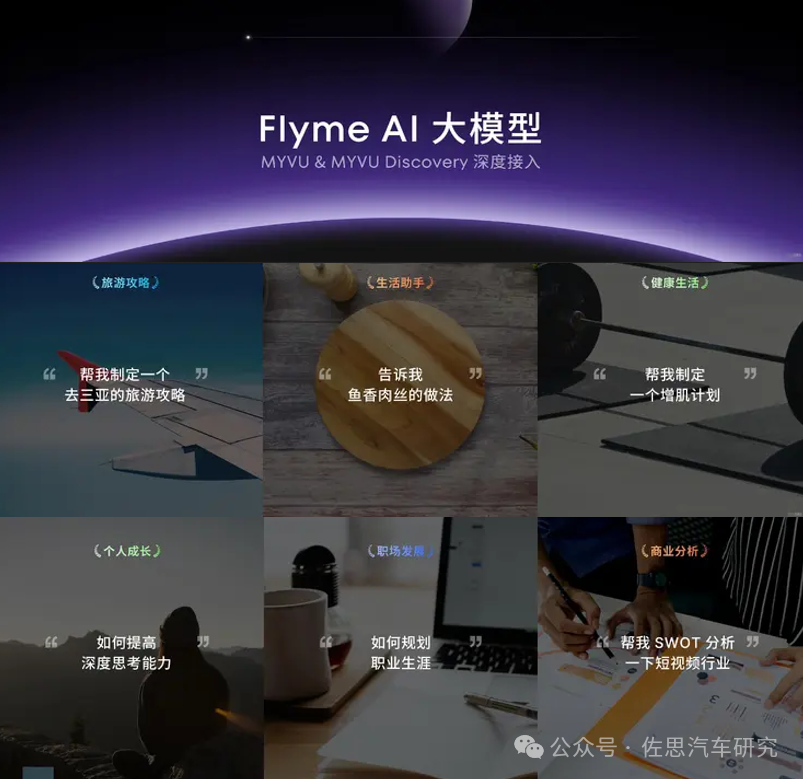
Source: Starco Meizu
The automotive XR scene is expanding from entertainment to assisting driving and vehicle control scenarios.
Currently, XR primarily caters to user demands for in-cabin entertainment, such as watching movies and playing games. Additionally, manufacturers are also exploring other application scenarios, such as assisting in driving and vehicle control.
At CES 2024, BMW collaborated with XREAL to showcase the XREAL Air 2 AR glasses. These glasses integrate vehicle information, infotainment, vehicle electronic data, BMW cloud information, and more. Once users wear the AR glasses, they can experience navigation instructions, hazard warnings, entertainment content, charging station locations, parking conditions, and other information in the real environment.
BMW enhances driving experience with AR glasses.
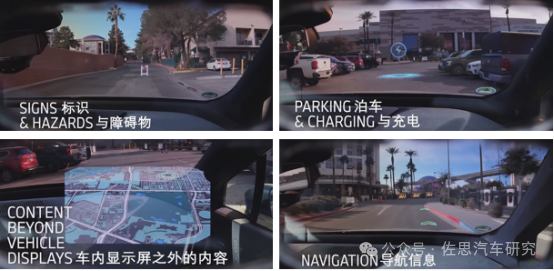
Source: BMW
At CES 2023, the Audi activesphere concept car was unveiled, equipped with four AR headsets. Through the Magic Leap 2 AR glasses, the driver can view real-time trip data, road conditions, location, and navigation information on a MR visual interface with a 70° FOV (Field of View); passengers can control the air conditioning temperature, airflow, and audio system next to the seat through gestures.
Additionally, AR technology can extend beyond the cabin. During off-road driving, terrain maps can be projected onto the surrounding environment, while traffic information, routes, and safety warnings can be layered and projected into the driver's road view during commuting.
The Audi activesphere concept car incorporates augmented reality (AR) technology.
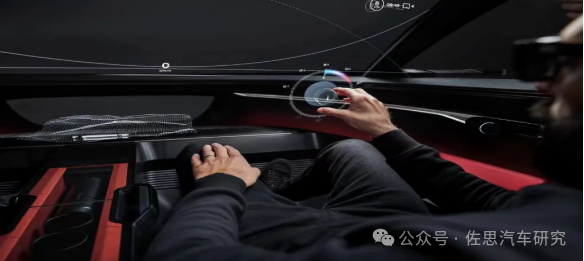
来源:奥迪
原文始发于微信公众号(佐思汽车研究):Car-mounted VR/AR/MR research: integrating with in-car systems and mobile devices to create a multi-terminal integrated experience.








